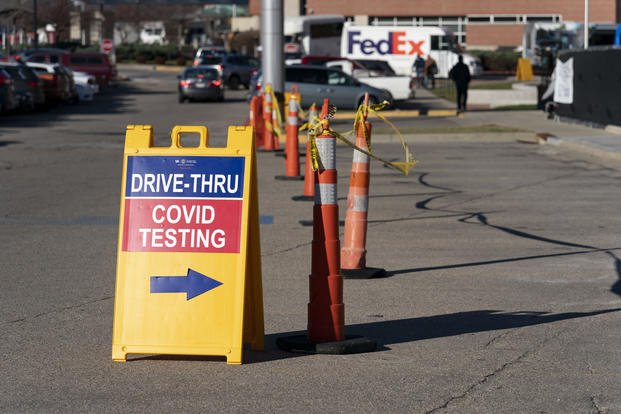The Department of Veterans Affairs can’t account for at least $187 million in supplementary COVID-19 funding spread across more than 10,000 transactions related to the pandemic, according to a House oversight committee.
Congress and the VA are at odds over the department's handling of nearly $37 billion in additional funding it received to address the COVID-19 pandemic, with House Veterans Affairs Committee leaders on both sides of the aisle critical of its failure to account for every dime.
Chairman Mike Bost, R-Ill., and ranking member Rep. Mark Takano, D-Calif., praised the department for its pandemic response overall but called the VA out for its inability to account for the money, during a hearing sidetracked by GOP rancor over the department's messaging on debt ceiling legislation.
Read Next: Biden Nominates Air Force General to Lead NSA, Cyber Command
"We need to make sure that the money is being spent wisely. You can say it's a paperwork error. You can say whatever. But that's why we have oversight," Bost said. "No offense to sailors, but the last three years during COVID, we've spent money like drunken sailors, and the oversight has not occurred. It is going to occur."
Between 2020 and 2021, the VA received roughly $37 billion to address COVID-19 response, including an initial $60 million, followed by $19.6 billion in the Coronavirus Aid, Relief, and Economic Security Act and another $17 billion in the American Rescue Plan.
As part of the deal to receive the funding, the department was required to account for its spending, a mandate underscored by passage in November 2021 of the VA Transparency and Trust Act.
Across a series of 40 reviews and reports, the VA Office of Inspector General found numerous accounting issues involving the COVID-19 funds, including a lack of visibility over payroll, some contracts and medical supplies.
The IG said the problems are attributable to the department's decentralized management structure, as well as an outdated financial information technology software – that it doesn't expect to modernize for another decade.
It determined that the department was challenged by inaccurate payroll accounting; used manual transfers and adjustments to its financial management systems that led to at least 53 reporting errors; had problems with supply acquisition, such as duplicate purchases; and failed to properly oversee its efforts to provide telehealth hardware to veterans, namely distributing tablet computers and cell phones so they could access health care but not recouping the equipment when the veteran failed to use it.
Given the issues, both Bost and Takano said they have concerns for the $2.1 billion remaining in American Rescue Plan funds, with Bost and fellow Republicans saying the money should be returned, while Takano pressed the VA to be more transparent as it continues using the funding.
"The lack of accountability and transparency that can be provided to auditors and to Congress as a result of this failure damages VA's credibility and invites questions about the extent of potential waste, fraud, and abuse," Takano said.
But he added, "I want to just remind the committee again that there was never a link to the public health emergency and the American Rescue Plan funding," in response to Republican concerns over the money from the legislation, which had fewer use restrictions than previous pandemic funding.
VA officials told the committee Tuesday that the department will spend the remaining American Rescue Plan money by the end of the fiscal year for programs initiated during the pandemic such as housing and telehealth for homeless veterans; prosthetics and medical research, including studies of long COVID; and on preventing the spread of contagious diseases in hospital and administrative settings.
"VA is proud of the role we played in the federal response to the pandemic, which touched every part of these operations. In particular, our response to COVID-19 demonstrated the strength and agility of an integrated health care system that provided the resources needed to accomplish its mission," VA Chief Financial Officer Jon Rychalski testified.
Bost acknowledged the importance of such programs but added that the VA's regular budget should pay for them.
"I am concerned that the VA is getting dependent on these one-time supplementals from Congress," Bost said. "We need to provide for veterans' care and benefits in the regular budget and oversee that money to ensure it serves veterans well."
The Biden administration has requested $320 billion to fund the VA in fiscal 2024, an increase of 5.4% over actual 2023 levels. Last week, the House Appropriations Subcommittee for Military Construction, Veterans Affairs and Related Agencies forwarded legislation that would provide the same amount for the VA for fiscal 2024.
Since the start of the pandemic, more than 874,000 cases of COVID-19 have been diagnosed at the VA. At least 24,670 veterans, staff members and civilian patients -- cared for as part of the national response -- died.
As of Tuesday, the VA was treating 2,049 active cases of COVID among veterans, employees and other beneficiaries. Nationwide, about 9,000 Americans per week are still being hospitalized for COVID-19. Deaths fell to 281 the week of May 13, according to the Centers for Disease Control and Prevention.
-- Patricia Kime can be reached at Patricia.Kime@Military.com. Follow her on Twitter @patriciakime.
Related: Toxic Exposure Law Triggers Tsunami of Veteran Disability Claims












